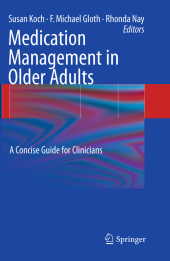 Neuerscheinungen 2010Stand: 2020-01-07 |
Schnellsuche
ISBN/Stichwort/Autor
|
Herderstraße 10
10625 Berlin
Tel.: 030 315 714 16
Fax 030 315 714 14
info@buchspektrum.de |

F. Michael Gloth, Susan Koch, Rhonda Nay
(Beteiligte)
Medication Management in Older Adults
A Concise Guide for Clinicians
Eds.: Koch, Susan; Gloth, F. Michael, Nay, Rhonda
2010. x, 188 S. 4 SW-Abb., 17 Tabellen. 23,5 cm
Verlag/Jahr: SPRINGER, BERLIN; HUMANA PRESS 2010
ISBN: 1-60327-456-1 (1603274561)
Neue ISBN: 978-1-60327-456-2 (9781603274562)
Preis und Lieferzeit: Bitte klicken
This book presents the latest information on research interventions designed to reduce the incidence of medication errors in older adults, with a focus on acute, subacute, and long-term residential care settings.
Medication use is the predominant form of health intervention in our society. And as we age, the likelihood of medication use increases dramatically, with more than 80 percent of those over age 65 using one or more medications. Along with that, the potential for medication errors also increases. Indeed adverse drug reactions (ADRs) and adverse drug events (ADEs) are a significant problem in older adults. Written in a practical format by contributors from Australia and the United States, Medication Management in Older Adults: A Concise Guide for Clinicians presents the available evidence on research interventions designed to reduce the incidence of medication errors in older adults, with a focus on acute, subacute, and residential (long-term) care settings. Because medication errors can occur at all stages in the medication process, from prescription by physicians to delivery of medication to the patient by nurses, and in any site in the health system, it is essential that interventions be targeted at all aspects of medication delivery. Chapters cover the principles of medical ethics in relation to medication management; common medication errors in the acute care sector; medication management in long-term care settings; nutrition and medications; the outcomes of a systematic review; dose form alterations; Electronic Health Records (EHR), Computerized Order Entry (COE), Beers criteria; and pharmacokinetics and pharmacodynamics. For those clinicians especially concerned with providing the best possible outcomes for their older adult patients, Medication Management in Older Adults: A Concise Guide for Clinicians is an invaluable resource and a significant contribution to the burgeoning literature on medication errors.
Chapter 1. Is There A Problem? The Evidence of Types and Causes of Medication Errors by Health Care Workers.
Michael Murray.
Chapter 2. Quality Use of Medicines: History And Progress In Policy And Practice.
Sue Hunt.
Chapter 3. The Ethics of Prescribing Medications for Older Adults. David Le Couteur, Hal Kendig, Vasi Naganathan andAndrew McLachlan.
Chapter 4. Common Medication Errors in The Acute Care Sector.
Susan Koch, Helen Forbes and Pauline Wong.
Chapter 5. Common Medication Errors in Long-Term Care Settings.
Catherine Edgar, Penny Harvey.
Chapter 6. The Impact of Medication on Nutritional Status of Older People.
Yvonne Coleman.
Chapter 7. Medication Management in Older Adults. What a Systematic Review Tells Us.
Brent Hodgkinson.
Chapter 8. Misuse of Formulations in the Aged Care Setting.
Andrew McLachlan, Iqbal Ramzan.
Chapter 9. Electronic Health Records, Medications, and Long-Term Care
F. Michael Gloth.
Chapter 10. Computerized Order Entry
F. Michael Gloth.
Chapter 11. Inappropriate Prescribing - Beers Criteria, Polypharmacy, and Drug Burden.
F. Michael Gloth.
Chapter 12. Dosing Errors: Age-Related Changes in Pharmacokinetics.
Andrew McLachlan, Sarah Hilmer and David Le Couteur


